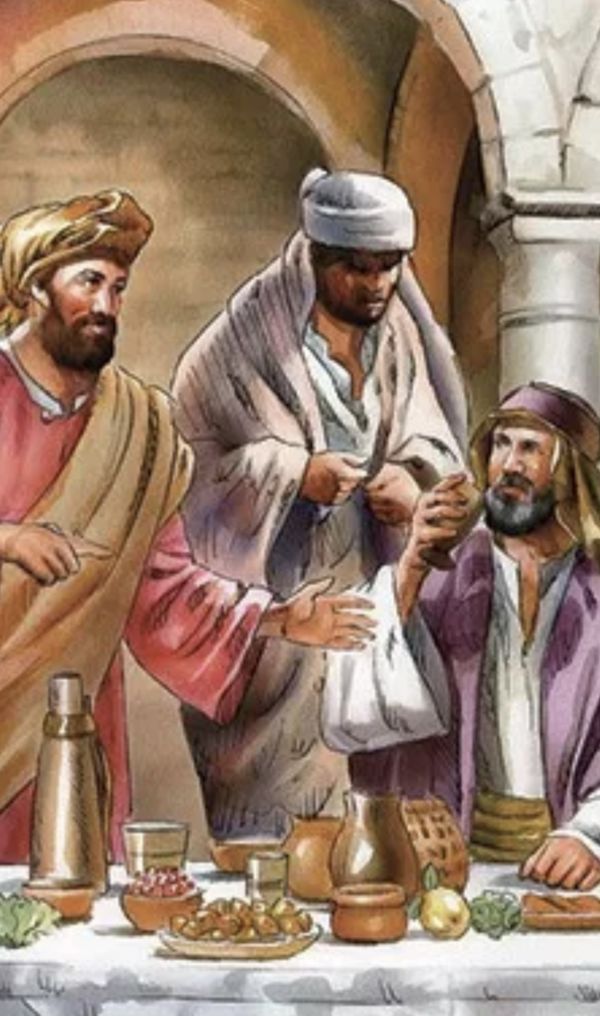(Lk 14:15-24)
Jesus does not compare the Father's Kingdom to a solemn assembly, but to a great Supper!
However, the proposal of festive novelty is rejected. The self-sufficient ones and experienced have other commitments and interests.
The invitation to take part in the Feast was initially addressed to the sons of Israel, who still likened the Messianic times to a Banquet, characterised by gratitude and [internal] fraternity.
In the first communities, the difficulties in broadening the criteria of communion came precisely from converts from Judaism, who by long practice retained the custom of not sharing food with those far away; thus the breaking of the Eucharistic Bread.
Within the framework of their conventions and the sacred norms attested in the Torah (Deut 20:5-7), the behaviour of those refusing the invitation in the parable of the Banquet (vv.18-20) was legitimate from the point of view of the recognised right - not friendship.
It is to accentuate the meaning of the gesture that the master of the feast orders the servants to gather precisely those who were socially excluded from the ancient religion, because they were considered impure: the pagans, the wobblers. Open ones to waiting for.
Christ continues to draw a dividing line between those who advocate an untouchable order and ideals above human reality, and those who, being on the periphery, are always willing to participate in the Feast.
They are not the “all concerned with ritual”, manners, appearance; but with the life they spread.
They do not let themselves be conditioned by privileges, their things, and laws: they give without double-entry.
They accept with natural readiness; rejoicing in reality and not in the distinction between sacred and profane.
They do not think already have the answer, and do not end up being slaves to it.
Jesus' teaching invites not to limit one's affections and not to let one's heart be cluttered by customs, by the particular or current mentalities, by legalistic blocks - or by the 'many things'.
In the assembly of sons, it is not the well provided for [serious, busy people with no time to waste, with too many possessions and invitations to manage] but the petty people... who come to the fore. Despite their poor aptitude.
All this, because characteristic of the Little and beggar is the readiness to cross fences: that which makes them fit to grasp God's summons.
Those who are far away - even if they are on tight corner - fill the Father's House.
‘In society’ the poor man is one of many, but the invitation to [Eucharistic] canteen conveys to him a sense of values that do not suffocate life with pettiness, and ties.
Indeed, the poor man often has a better understanding of divine-human things.
This ever more conscious resemblance to the Son of God is accentuated in the scarcity of ‘adequate means’: scarcity that makes true, that induces others to reflect - remaining unremarkable, incapable of “make lightning”.
Our solidarity is not a matter of sympathy, common interests and esprit de corps, but rather the result of an extended Calling; of one powerful Life circulating in all, respecting their freedom and reality - as well as their phases of change.
Paraphrasing the encyclical Fratelli Tutti [nos.13-15, passim] according to the passage from Lk we must remain careful not to impoverish the life of Faith, turning it into a detached commitment to «cultural colonisation».
If this were the case, even the universal-Catholic horizon of a conviviality of differences would dissolve into an overly normalised, utterly predictable; ultimately deserted invitation.
The entrenched or self-interested rejection of the Banquet would bring with it - as before our eyes - the «further disintegration» of «critical thinking», of action «for justice», of its «paths to integration».
In fact, even ecclesial society can run the risk of «distorting the great words», «risking impoverishment»; thus «reducing itself to the arrogance of the strongest» and to «merely ephemeral marketing recipes, which find in the destruction of the other the most effective resource».
But God's people cannot live in a parallel, disconnected, double world - as if the One Eternal worshipped was a patchwork of wiles, marketing and convenience.
[Tuesday 31st wk. in O.T. November 5, 2024]












